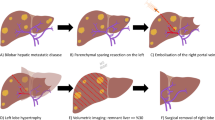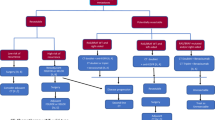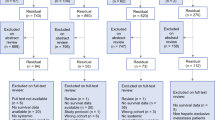Abstract
Purpose
To investigate timing of Yttrium-90 radioembolization (Y90) during treatment course, genomics, and other clinical factors as predictors of overall survival (OS) in colorectal liver metastasis (CRLM) that have progressed on at least one line of chemotherapy.
Materials and Methods
This was a retrospective study from 2013 to 2018 of patients with CRLM and genomic analysis prior to Y90 at a multihospital tertiary referral center. OS from liver metastasis diagnosis and predictors of OS were analyzed using Kaplan–Meier estimation with log-rank and Cox regression analyses.
Results
Overall, 58 patients with CRLM who progressed on at least one line of chemotherapy who had genomic analysis prior to Y90 were identified. Median OS after hepatic metastasis was 29.9 months. Of these, 16 (28%) patients received Y90 after failure of the first-line systemic chemotherapy. There was significantly prolonged OS in patients receiving Y90 immediately following failure of the first-line chemotherapy folinic acid, fluorouracil, oxaliplatin ((FOLFOX) ± bevacizumab) versus following multiple lines of chemotherapy (median OS of 46.3 vs. 26.6 months, P = 0.005). The presence of genetic mutation in tumor, MAPK pathway wild type, left-sided primary tumor, low MELD score, and non-diffuse unilobar disease were also found to be predictors prolonged survival on log-rank analysis (P’s < 0.05). On multivariate analysis, receiving Y90 after failure of the first line of chemotherapy, low baseline MELD score, and baseline ECOG performance score of 0 were all found to be independent predictors of prolonged OS from the time of metastatic disease diagnosis (P’s < 0.05).
Conclusion
In patients with CRLM, receiving Y90 after failing the first line of chemotherapy, lack of genetic mutation, low MELD score, and lower tumor burden appear to be independent predictors of prolonged OS.
Level of Evidence
Level 4, case–control study.



Similar content being viewed by others
References
Bray F, Ferlay J, Soerjomataram I, Siegel RL, Torre LA, Jemal A. Global cancer statistics 2018: GLOBOCAN estimates of incidence and mortality worldwide for 36 cancers in 185 countries. CA Cancer J Clin. 2018.
Tomlinson JS, Jarnagin WR, DeMatteo RP, Fong Y, Kornprat P, Gonen M, et al. Actual 10-year survival after resection of colorectal liver metastases defines cure. J Clin Oncol. 2007.
Fang JY, Richardson BC. The MAPK signalling pathways and colorectal cancer. Lancet Oncol. 2005.
Nojadeh JN, Sharif SB, Sakhinia E. Microsatellite instability in colorectal cancer. EXCLI J. 2018.
Cathomas G. PIK3CA in Colorectal Cancer. Front Oncol. 2014.
Zhang K, Wang H. Cancer Genome Atlas Pan-cancer analysis project. Chin J Lung Cancer. 2015.
Allegra CJ, Jessup JM, Somerfield MR, Hamilton SR, Hammond EH, Hayes DF, et al. American society of clinical oncology provisional clinical opinion: testing for KRAS gene mutations in patients with metastatic colorectal carcinoma to predict response to anti-epidermal growth factor receptor monoclonal antibody therapy. J Clin Oncol. 2009.
Vilar E, Gruber SB. Microsatellite instability in colorectal cancer—the stable evidence. Nat Rev Clin Oncol. 2010.
Saxena A, Bester L, Shan L, Perera M, Gibbs P, Meteling B, et al. A systematic review on the safety and efficacy of yttrium-90 radioembolization for unresectable, chemorefractory colorectal cancer liver metastases. J Cancer Res Clin Oncol. 2014.
Kennedy A, Ball D, Cohen S., Cohn M, Coldwell D, Drooz A, et al. U.S. patients receiving resin 90Y microspheres for unresectable colorectal liver metastases: A multicenter study of 506 patients. J Clin Oncol. 2012.
Kennedy AS, Coldwell D, Nutting C, Murthy R, Wertman DE, Loehr SP, et al. Resin 90Y-microsphere brachytherapy for unresectable colorectal liver metastases: modern USA experience. Int J Radiat Oncol Biol Phys. 2006;.
Dendy MS, Ludwig JM, Kokabi N, Stein SM, Lacy J, Hochster HS, et al. Genomic mutations and histopathologic biomarkers in Y90 radioembolization for chemorefractory colorectal liver metastases. Oncotarget. 2018.
Janowski E, Timofeeva O, Chasovskikh S, Goldberg M, Kim A, Banovac F, et al. Yttrium-90 radioembolization for colorectal cancer liver metastases in KRAS wild-type and mutant patients: Clinical and ccfDNA studies. Oncol Rep. 2017.
Lahti SJ, Xing M, Zhang D, Lee JJ, Magnetta MJ, Kim HS. KRAS status as an independent prognostic factor for survival after yttrium-90 radioembolization therapy for unresectable colorectal cancer liver metastases. J Vasc Interv Radiol. 2015.
Magnetta MJ, Ghodadra A, Lahti SJ, Xing M, Zhang D, Kim HS. Connecting cancer biology and clinical outcomes to imaging in KRAS mutant and wild-type colorectal cancer liver tumors following selective internal radiation therapy with yttrium-90. Abdom Radiol. 2017.
SIRTex. SIR-Spheres® Y-90 resin microspheres [Package Insert]. 2017;57:1–3. https://www.sirtex.com/media/155126/ssl-us-13.pdf.
Scaltriti M, Baselga J. The epidermal growth factor receptor pathway: A model for targeted therapy. Clin Cancer Res. 2006.
Cox AD, Fesik SW, Kimmelman AC, Luo J, Der CJ. Drugging the undruggable RAS: mission possible? Nat Rev Drug Discov. 2014.
Amikura K, Akagi K, Ogura T, Takahashi A, Sakamoto H. The RAS mutation status predicts survival in patients undergoing hepatic resection for colorectal liver metastases: The results from a genetic analysis of all-RAS. J Surg Oncol. 2018.
Passiglia F, Bronte G, Bazan V, Galvano A, Vincenzi B, Russo A. Can KRAS and BRAF mutations limit the benefit of liver resection in metastatic colorectal cancer patients? a systematic review and meta-analysis. Crit Rev Oncol Hematol. 2016.
Petrelli F, Comito T, Barni S, Pancera G, Scorsetti M, Ghidini A. Stereotactic body radiotherapy for colorectal cancer liver metastases: a systematic review. Radiother Oncol. 2018.
Cuneo KC, Mehta RK, Kurapati H, Thomas DG, Lawrence TS, Nyati MK. Enhancing the radiation response in KRAS mutant colorectal cancers using the c-Met inhibitor crizotinib. Transl Oncol. 2019.
Wang M, Han J, Marcar L, Black J, Liu Q, Li X, et al. Radiation resistance in KRAS-mutated lung cancer is enabled by stem-like properties mediated by an osteopontin-EGFR pathway. Cancer Res. 2017.
Gray B, Van Hazel G, Hope M, Burton M, Moroz P, Anderson J, et al. Randomised trial of SIR-Spheres plus chemotherapy vs. chemotherapy alone for treating patients with liver metastases from primary large bowel cancer. Ann Oncol Off J Eur Soc Med Oncol [Internet]. 2001 [cited 2019 May 15];12:1711–20. http://www.ncbi.nlm.nih.gov/pubmed/11843249.
Van Hazel G, Blackwell A, Anderson J, Price D, Moroz P, Bower G, et al. Randomised phase 2 trial of SIR-Spheres® plus fluorouracil/leucovorin chemotherapy versus fluorouracil/leucovorin chemotherapy alone in advanced colorectal cancer. J Surg Oncol [Internet]. 2004 [cited 2019 May 15];88:78–85. http://www.ncbi.nlm.nih.gov/pubmed/15499601.
Wasan HS, Gibbs P, Sharma NK, Taieb J, Heinemann V, Ricke J, et al. First-line selective internal radiotherapy plus chemotherapy versus chemotherapy alone in patients with liver metastases from colorectal cancer (FOXFIRE, SIRFLOX, and FOXFIRE-Global): a combined analysis of three multicentre, randomised, phase 3 trials. Lancet Oncol [Internet]. 2017 [cited 2019 May 15];18:1159–71. http://www.ncbi.nlm.nih.gov/pubmed/28781171.
Funding
This study was not supported by any funding.
Author information
Authors and Affiliations
Corresponding author
Ethics declarations
Conflict of interest
The authors declare that they have no conflict of interest.
Consent for Publication
For this type of study, consent for publication is not required.
Human and Animal Rights
This article does not contain any studies with human participants or animals performed by any of the authors.
Ethical Approval
This study has obtained IRB approval from the relevant board, and the need for informed consent was waived.
Additional information
Publisher's Note
Springer Nature remains neutral with regard to jurisdictional claims in published maps and institutional affiliations.
Rights and permissions
About this article
Cite this article
Dabrowiecki, A., Sankhla, T., Shinn, K. et al. Impact of Genomic Mutation and Timing of Y90 Radioembolization in Colorectal Liver Metastases. Cardiovasc Intervent Radiol 43, 1006–1014 (2020). https://doi.org/10.1007/s00270-020-02463-z
Received:
Accepted:
Published:
Issue Date:
DOI: https://doi.org/10.1007/s00270-020-02463-z




